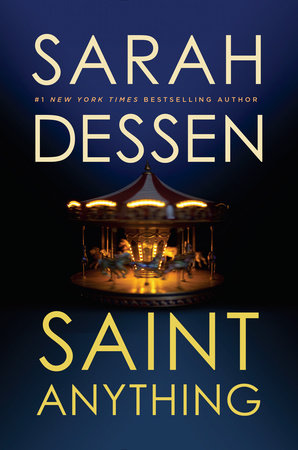 Saint Anything, Sarah Dessen
Saint Anything, Sarah DessenViking, May 2015
Reviewed from final copy
Truth time: I’m slightly embarrassed to admit that Saint Anything is the first Sarah Dessen novel I’ve read; I didn’t read YA when I was actually in that demographic and she was never on my syllabi as an education or library student. Although I had always heard good things about Dessen, I wasn’t sure what to expect from this book. The cover is gorgeous but vague and the title’s significance is unclear even after reading the jacket copy. However, a few things became clear after reading this novel: first, the title and cover couldn’t be more perfect for the story contained within (high fives all around, book team); second, reading Sarah Dessen when I was a teen would have made me happy; and finally, I had so many feels while reading that at one point, I had to get up and walk away from the book because I wanted a really beautiful moment to sink in.
Although reviews have been mostly positive, it has only received one star (from Publishers Weekly). We had Saint Anything on our radar thanks to reader, Cecilia, who mentioned it in response to our final post last season. If you’ve read my reviews before (::cough:: Eleanor & Park ::cough:: I’ll Give You the Sun) you know how I feel about romance and relationships in YA lit. Falling in love when you’re a teen is serious stuff and it takes a skilled writer to capture that experience authentically. So why isn’t it a given that we look at YA stories about romance with the same critical lens as other “serious” books? That’s a whole conversation for another day (or the comments). For now, let’s talk Saint Anything.
I’m venturing into spoiler territory. Tread carefully beyond this point.
In terms of Printz criteria, Saint Anything is strongest in its character development. Dessen’s execution of theme is blunt but present. It’s very clear from early on that she’s interested in exploring how and why people change, and more specifically, how a teen’s sense of self can changes as they readjust their understanding of others. Dessen also takes on drugs, alcohol abuse, prison, sexual abuse, and living with chronic illness, each issue presented through a character’s struggle. She has everything hang around Sydney so that she’s the emotional core, making the “issues” serve her character development as a girl trying to carve out a sense of identity when she’s always been in the shadow of her older, delinquent brother. The text doesn’t feel weighed down by all of the “issues” (because it always serves character); however, the integration isn’t always elegant. When Sydney describes why she and her new friend Layla have a connection, Dessen just flat out tells the reader (through Sydney), “…that was the thing. Layla got it. Not just my uneasiness with Ames, but also how I felt about Peyton. Rosie might not have been in jail, but her problems had spilled over to affect all of the Chathams… . ” It certainly gets the job done, but the explanation was redundant because she had already done the work of showing the growing friendship.
Sydney and Layla’s relationship is at the heart of the novel, and just as important as Sydney’s romance with Layla’s brother, Mac. All three characters are developed nicely, each having an inner life and objectives. Layla does veer into “cool new friend” tropey territory but as Sydney gets to know her, she softens into a real character. Of the trio, Mac is underdeveloped, being almost impossibly good as the quiet, beautiful musician boy who used to be fat. But his dynamic with Sydney gives him life. The adults may make frustrating decisions but you can see how they got there because they are whole people. As she does with theme though, Dessen spells out the psychology too much. The writing already allows for readers to make the discovery on their own.
It doesn’t quite reach Printz heights, but Saint Anything is so close. Despite its flaws (and really, I wouldn’t call them flaws so much as limitations) I connected with this book because Dessen understands people so well. This story that she’s telling, we’ve all been there. It’s about those times in your life when you find people you who make your life brighter and fill a space you didn’t even know was there. They make you feel welcome and safe and loved when you didn’t realize that’s all you needed. It’s a quintessential coming-of-age experience that she has captured beautifully.
Some stray thoughts:
- Ames made my skin crawl. Good job, Sarah Dessen for making that happen, but ew.
- Peyton, Sydney’s brother who is in jail for drunk driving and seriously injuring another person, goes through a very interesting arc of his own. Sydney’s struggle with their relationship, how she feels about living in someone’s shadow, and grappling with the fact that her life isn’t entirely her own because of his actions are all fascinating aspects of her development.
- “I would have loved to know how it felt, just once, to have something fall apart and see options instead of endings” – A time that I didn’t mind having Sydney explicitly say the thing we’re meant to understand from the scene.
- That time the book made me get up because the feels were so strong? It’s a quiet stunner at the end of chapter 14.
- The carousel! OMG.
RELATED
ALREADY A SUBSCRIBER? LOG IN
We are currently offering this content for free. Sign up now to activate your personal profile, where you can save articles for future viewing



Be the first reader to comment.
Comment Policy:
Comment should not be empty !!!